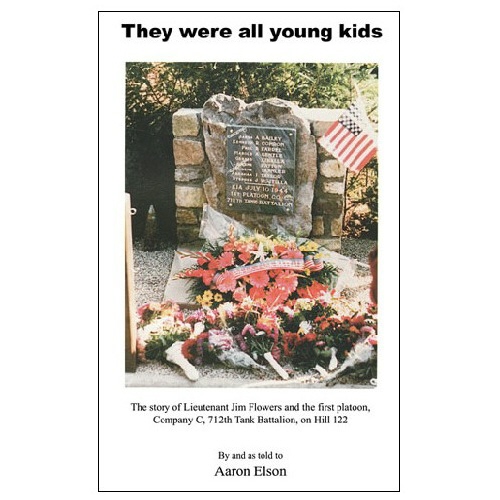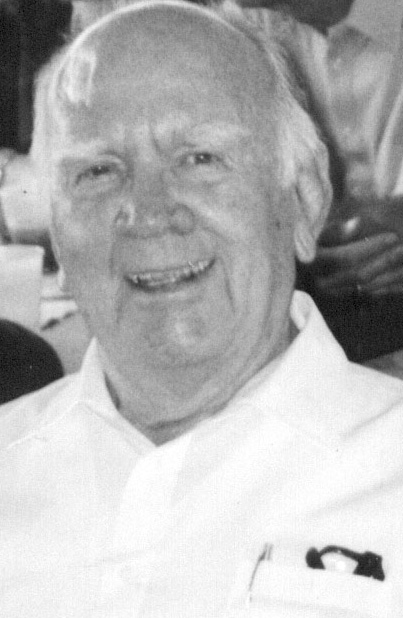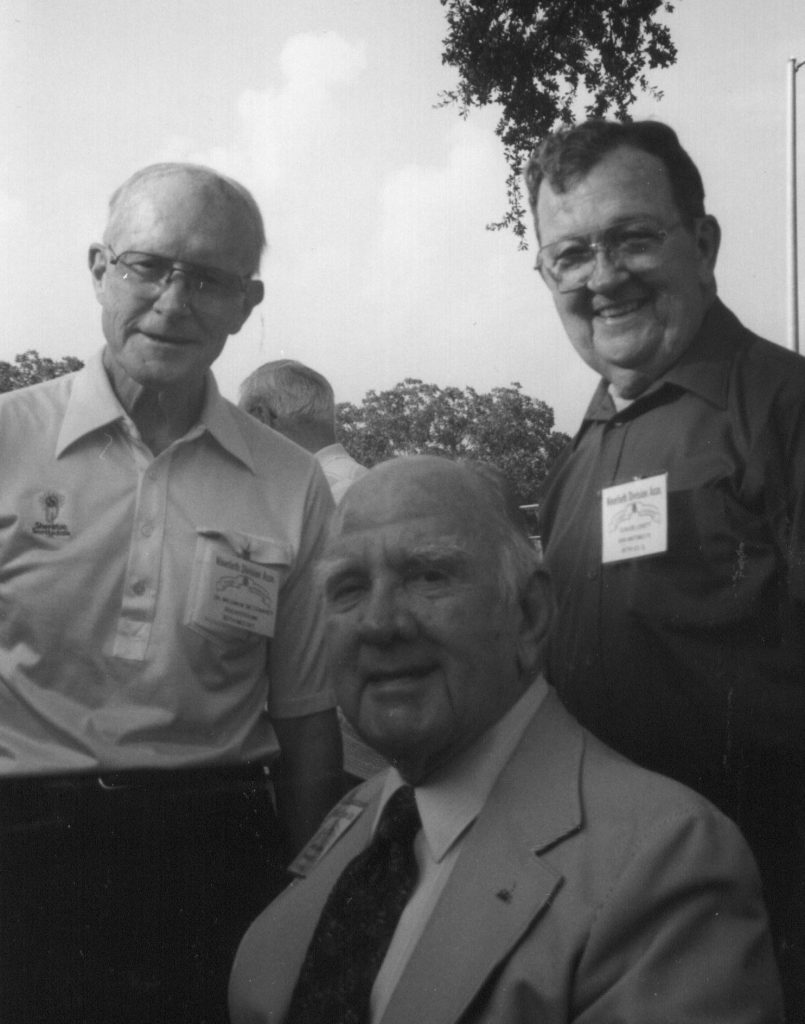
A quiet, early dawn (excerpt)
Jim Rothschadl
The next morning, we were still laying there. I hardly slept. We kept listening. The Germans set up their line right there, I don’t know if Flowers told you, they set up their machine gun positions. They were walking back and forth past us all the time. But they left us alone. Jim says in this, I’ve got a narrative that Jim wrote, he wondered in there how come they didn’t kill us. They must have thought we looked so damn horrible that we weren’t gonna hurt nobody, so they just left us. I can’t figure it out either.
But anyway, the first day, our people – we were cut off there, you see, and our people – we must have been quite a ways out there from our lines because they put artillery in, and they don’t put artillery in at close range. The Germans were lined up there and our people knew they were lined up there where our tanks were burned out. So they laid a hell of an artillery barrage, not knowing that we were there. Even if they had known they would have done it.
It just practically plowed up that field. And one of them landed between Jim and the infantry boy. I heard Jim scream. He let out a hell of a scream. And I looked over there and Jesus Christ, his other leg was gone!
Somehow, he managed to get a tourniquet on it.
And then we were out there all that day, and all that night. It’s Sunday night now, we were out there the night of the 10th, the night of the 11th, and we got picked up on the morning of the 12th.

During the night of the 11th, the Germans did what they did many other times, they picked up their stuff and moved back a few hedgerows. And our people thought they were still in this place. And they would shell that place, and instead the guys are back safe over there. So sometime during that night, I could hear them talking with one another. They were pulling back. I don’t know how far back. I said to myself, “Well!” I had my faculties. I wasn’t berserk.
Then morning came, the 12th. A quiet, early dawn. Everything was quiet. You couldn’t hear a shot. In fact I heard birds singing. I was laying there, and I was really feeling bad. I thought about dying. I wanted to. In fact, I crawled away from Jim.
I crawled up to the hedgerow, it was only about eight feet away. And I lay there, and some other things. … There’s a difference between my version here and Jim’s, on that morning. I crawled back to where he was laying, he was eight, ten feet away. He says to me, “Give me a cigarette.”
I had cigarettes, but my hands, you’d be surprised how a fellow swells up. My hands were huge from the swelling. I couldn’t get in my pocket. I remember trying to get in my pocket because the cigarettes were there, and I wanted a cigarette, too. But I couldn’t get in my pocket.
The next thing he said, he swore a little bit, he said, “Jesus Christ, Jim,” he said, “you’d better go get some help.”
I said, “Why?”
“I’m getting gangrene in my legs. I’m getting gangrene,” he said. “Can you see a little bit?”
And I said, you know, it was hard to talk because I’d swelled up so much. But I knew what he said. I was desperate myself. And everything was quiet. So when he told me about this gangrene, I crawled out of this damn hole, and I’ve got a diagram around here, I know exactly what I did. But I went the wrong way. You know, I was confused somewhat, directions. The tanks were laying up there, they were still smoldering. So I put my left shoulder kind of to the hedgerow and was crawling along, blind, then I’d stop once in a while and I’d look. And I was trying to call for medics. At least that’s what I was trying to do. I don’t know if I got any noise out or not, I don’t know. And I don’t know how far I crawled, it might have been three, four hundred feet, or it might have been more, I don’t know. But all of a sudden I heard this awful kind of a laugh. And I stopped. There I was, sitting in front of a German machine gun nest. Three guys there were, behind it. It was a water-cooled machine gun, because it had the big casing on the barrel. And they were looking at me, and they were saying something and they kind of laughed a little bit. And I thought well, okay, shoot me. Go ahead. I didn’t give a damn. And they just had this awful kind of, I remember they laughed at me, one of them laughed. They must have thought I looked awful. My clothes were burned, I suppose, and I was all puffed up.

So after a few seconds, I turned around, I put my right shoulder to the hedgerow and I crawled back and I came back to that hole where Jim was, and I continued on past it, and I’d stop every once in a while, try to call for medics. I could hear. There was nothing wrong with my hearing. And I heard a little noise. I opened my eye up. I had crawled the other way maybe a hundred feet, whatever it was. The hedgerow came down and I was crawling along, and it turned to the left, and there was a GI, and he must have been down on his hands and knees because I saw the helmet down toward the ground, and a head, and I immediately recognized, even though I couldn’t see that well, I recognized a GI helmet. So I must have hollered or something, and pretty soon about three or four of them came from around that corner. And they picked me up and carried me some distance. It wasn’t too far, a couple or three hundred feet. And they were going through some water. I could hear water. I was so god damn thirsty. I was so thirsty. They laid me down, and I was begging for water. And I heard one of the guys say to the other fellow, “Just give him a little bit now.” I could have drank a barrel. “Just a little bit. Don’t give him much, now. Just a little bit.” And I was angry about that, because I was so thirsty.
Anyway, I got that water down. Then I was telling these guys, by that time there were eight or nine of them, they were infantry guys, I was telling them my lieutenant is laying back here. I must have really begged for them to go back there and get him.
So they left. They came back in a few minutes and said, “He’s dead.”
I guess I tried to get up, and I said, “No, no.” I was begging and begging, and they went back again. Then they brought Jim. They brought him and laid him down alongside of me. I don’t know if he recalls this or not, but they laid him down alongside of me, and then they sent for some people with stretchers. They brought some stretchers and carried us, both of us, side by side. First thing, they come to a jeep, and they laid both of us on the hood of the jeep, crosswards. They took us to a little aid station, and we were there for not very long, I don’t know how long we were there. Then they took us out of there and put us on the hood of a different jeep, which was a Duck (a DUKW, or amphibious vehicle). In the meantime they had given us some shots. And they took us down to the beach. And this jeep went right into the water, and took us to an LST. And it was full. They left space for walking, but it was full. Jim’s still with me. I was laying here, there was a little aisle, and he was laying on the other side. And there was another aisle. And the guy laying next to me kept asking me if I wanted a cigarette.
When we got to Southampton, we were still together. And they took us into a hospital, and that’s the last time I saw Jim then. They brought us in there, and he was laying over to the right and I was over here, on a gurney, and some doctors and nurses came over, and they were looking at me, and one of the nurses hollered, “Jesus! Come and look at this guy, they must be using gas over there!” And then pretty soon the chaplain came in. A Catholic chaplain. I happen to be Catholic. It shows on your dogtags. And he was gonna give me the last rites. He did. I didn’t want him to. I said, “Damn!” I swore at him, and told him to get the hell away from me. I made it this far I’m gonna make it. I don’t need no last rites. I was really angry. But he went through the procedure. And Jim was over there yet, and I heard him talking, I knew his voice, being with him so long. The last words he said, he said, “God damn it,” I’m quoting now. He’s talking to the nurses or the doctors. He said, “God damn it. Take good care of that corporal. He’s the best god damn gunner in the United States Army!” Real loud. Then I didn’t see him anymore. They took him somewhere else, and they took me from there to a hospital in England.